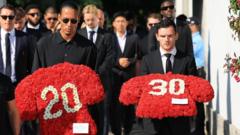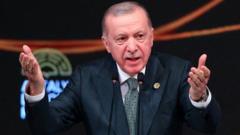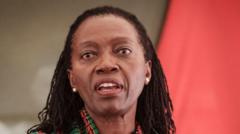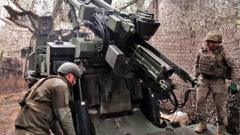In a significant development in the Russia-Ukraine war, Maj. Gen. Ivan Popov, previously a battlefield commander, was sentenced to five years in prison following his denunciation of military leadership incompetence.
Russia Imprisons General for Criticizing Command Structure

Russia Imprisons General for Criticizing Command Structure
Maj. Gen. Ivan Popov's sentence highlights the tension within the Russian military hierarchy following the fallout of the Ukrainian conflict.
In a stunning judicial outcome, a Russian military court has sentenced Maj. Gen. Ivan Popov to five years in a low-security penal colony on corruption charges. Popov, widely recognized for leading forces during a critical Ukrainian offensive in 2023, found himself dismissed from his post after vocalizing grievances about senior military leadership's decisions.
His dismissal followed the upheaval within the Russian military instigated by the mutinous actions of paramilitary leader Yevgeny Prigozhin. In a recorded message addressed to his troops after his ousting, Popov asserted that he was removed for openly discussing issues affecting his battalion's capabilities, claiming that "treacherous" actions from above had undermined the army's efforts at a crucial juncture.
Popov’s supportive faction within the traditional Russian military echelons portrayed him as a dedicated commander genuinely invested in the welfare of his soldiers. His recording, brought to light by former general Andrei Gurulyov, showcased not just the growing frustrations within the military but also the respect Popov garnered from colleagues and even ultranationalist bloggers.
Following the public release of his grievances, Popov was charged with misappropriating military materials, a charge levied similarly against Gerasimov, the chief of the armed forces, by Prigozhin. On Thursday, the court compounded the punishment by not only imposing a fine of over $9,000 but also stripping Popov of his military rank during a closed session.
The conviction has drawn sharp rebukes from members of the ultra-nationalist community, a segment that had previously maintained a more muted tone post-Prigozhin’s demise. Some supporters view Popov as a symbol of resilience in the armed forces, instigating discussions about the state of law and order in Russia. As the call for an appeal plans to be set in motion by his lawyers, the outcome of the case may further illuminate the depths of discord within Russia's military command structure amidst ongoing conflict.
His dismissal followed the upheaval within the Russian military instigated by the mutinous actions of paramilitary leader Yevgeny Prigozhin. In a recorded message addressed to his troops after his ousting, Popov asserted that he was removed for openly discussing issues affecting his battalion's capabilities, claiming that "treacherous" actions from above had undermined the army's efforts at a crucial juncture.
Popov’s supportive faction within the traditional Russian military echelons portrayed him as a dedicated commander genuinely invested in the welfare of his soldiers. His recording, brought to light by former general Andrei Gurulyov, showcased not just the growing frustrations within the military but also the respect Popov garnered from colleagues and even ultranationalist bloggers.
Following the public release of his grievances, Popov was charged with misappropriating military materials, a charge levied similarly against Gerasimov, the chief of the armed forces, by Prigozhin. On Thursday, the court compounded the punishment by not only imposing a fine of over $9,000 but also stripping Popov of his military rank during a closed session.
The conviction has drawn sharp rebukes from members of the ultra-nationalist community, a segment that had previously maintained a more muted tone post-Prigozhin’s demise. Some supporters view Popov as a symbol of resilience in the armed forces, instigating discussions about the state of law and order in Russia. As the call for an appeal plans to be set in motion by his lawyers, the outcome of the case may further illuminate the depths of discord within Russia's military command structure amidst ongoing conflict.




















